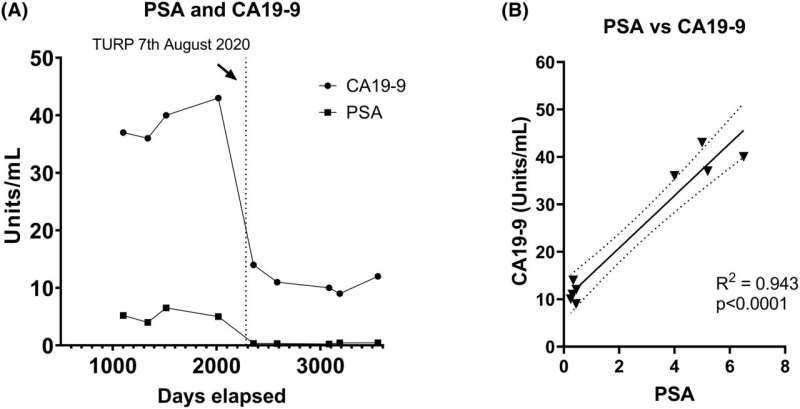This article has been reviewed according to Science X's editorial process and policies. Editors have highlighted the following attributes while ensuring the content's credibility:
fact-checked
trusted source
proofread
Quest for better pancreatic cancer tests gains insights from survivor's data

Patients with advanced cases of pancreatic cancer have a poor survival rate, and in the early stages the cancer does not usually produce any noticeable symptoms.
Thus, the search for accurate blood tests for early and reliable screening is a high priority to increase survival, says Flinders University research fellow Dr. Jean Winter.
"Our research is looking for alternative, newer and more reliable blood biomarkers—particularly those which can be used for early screening tests—for gastrointestinal cancers, including bowel, gastric, esophageal and also pancreatic cancer," says cancer researcher Dr. Winter, from the College of Medicine and Public Health.
While not as common as other solid tumors such as bowel, breast and prostate cancer, pancreatic cancer has only a 10% five-year overall survival rate and a median overall survival time of about seven months.
Due to this low survival rate, pancreatic cancer is expected to become the second and third leading cause of cancer-related deaths in Europe and the U.S. in the next five to 10 years respectively.
While there are currently no approved blood tests or screening programs for detecting pancreatic cancer, the serum carbohydrate antigen 19-9 (or "CA19-9") test is used for regular surveillance of cancer relapse in patients diagnosed with pancreatic cancer.
At Flinders University, one survivor's experience is helping to progress research into finding more effective blood tests for the main form of the lethal cancer, called pancreatic ductal adenocarcinoma (PDAC).
The clinical case study, researched and written by pancreatic cancer survivor and consumer advocate Steve Pendry and published in Clinical Case Reports, involved a multidisciplinary team including an oncologist, hepatobiliary surgeon and urologist.
"Steve has shared the data and his analysis of his own CA19-9 readings over the 10 years since his diagnosis," says Dr. Winter.
"These data were used to demonstrate that the increased readings of CA19-9 pancreatic cancer blood biomarker levels were in response to a benign prostate condition, rather than a relapse in his cancer. Once the prostate condition was treated, the CA19-9 levels immediately returned to normal, almost overnight."
Diagnosed with stage IIA borderline resectable pancreatic cancer at the age of 65 in 2013, Pendry underwent aggressive neo-adjuvant chemotherapy, a pancreaticoduodenectomy (or Whipple procedure) surgery and subsequent radiotherapy, with the CA19-9 blood test then used for monitoring his condition.
Pendry says his consumer advocacy, and now academic journal article, is raising awareness about pancreatic cancer and is helping to find shortcomings of current cancer biomarkers such as CA19-9 in support of the Flinders University research efforts for improved alternatives.
"By sharing the CA19-9 readings—particularly what happened between 2015 and 2020 when levels dropped due to my unrelated medical condition (benign prostatic hyperplasia)—we have added to our understanding of the limitations of standard biomarker testing," he says.
"What began as suspected indigestion a few days after my 65th birthday led to radical surgery.
"The first blood tests revealed elevated CA19-9 and subsequent CT and MRI scans revealed pancreatic cancer leading to major hepatobiliary surgery that saved my life.
"Blood tests continue to monitor my condition, and in 2017 I formed a support group for survivors of pancreatic cancer under the Pancare Foundation."
Pendry says early detection screening for pancreatic cancer would enable routine testing, but people's awareness—including in monitoring unusual stool characteristics and other indicators—is important across the community.
"Do not be afraid to ask questions. I have found all of the experts, medical practitioners and researchers are more than happy to answer them."
More information: Steve D. Pendry et al, Elevation of the tumor marker CA19‐9 in a pancreatic cancer survivor with benign prostatic hyperplasia: A clinical case report, Clinical Case Reports (2024). DOI: 10.1002/ccr3.8929

















